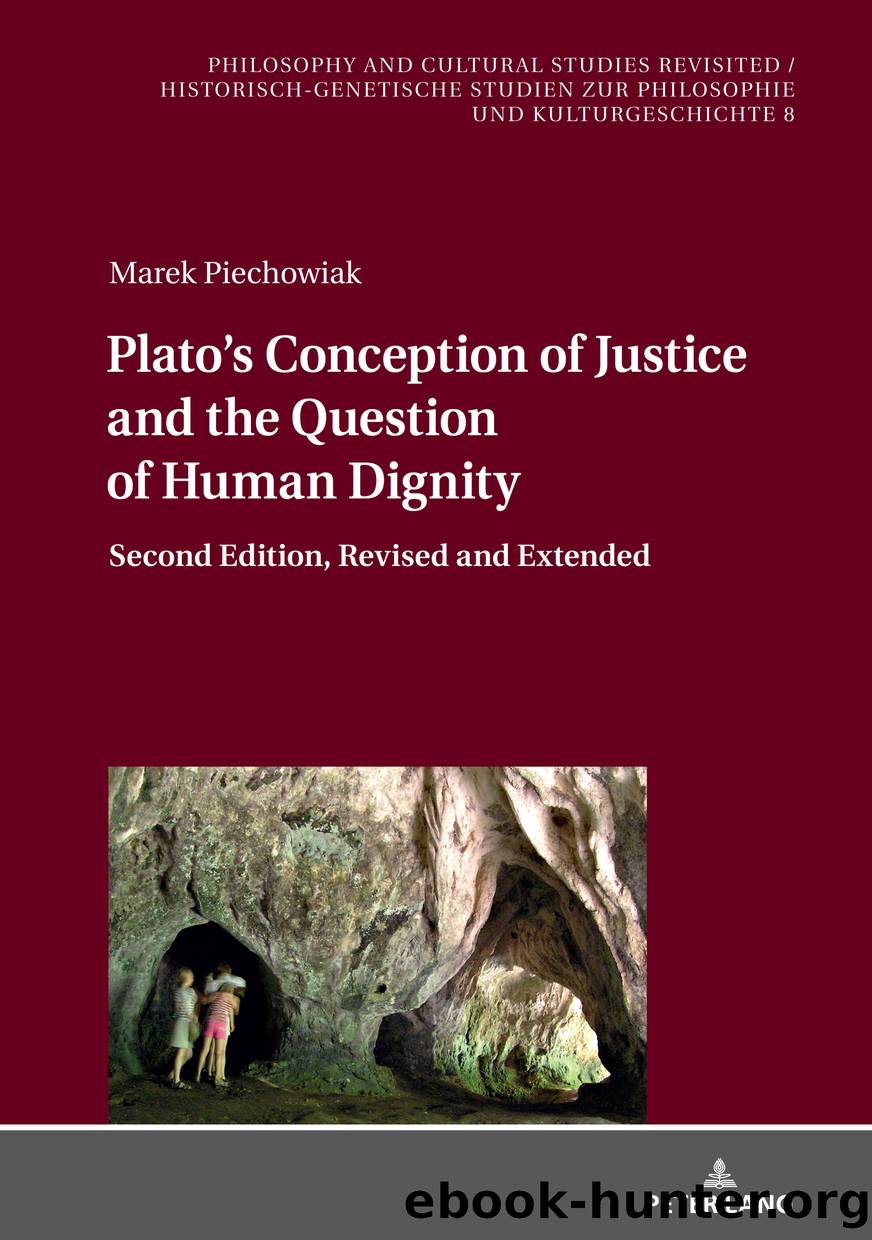Plato's Conception of Justice and the Question of Human Dignity by Marek Piechowiak;

Author:Marek Piechowiak;
Language: eng
Format: epub
Publisher: Peter Lang Copyright AG
â152 | 153â
5 Justice of the law and justice of the state
5.1 Foundations
Both the state and the law as its foundation are good if they realise the aims which are proper for them. Platoâs writings indicate the priority of the individual over the state; in his late dialogue the Laws, he makes explicit pronouncements regarding the aims of legislation: âThe whole point of our legislation was to allow the citizens to live supremely happy lives in the greatest possible mutual friendshipâ.541
There are two principal aims of lawâthe happiness of the citizens and friendship between them. Friendship is strictly connected with equality, and these issues will be considered in Chapter 6. Consequently, friendship and equality are also aims of the state which creates and implements the laws.
According to the Demiurgeâs speech in the Timaeus, it is due to having been created directly by the Demiurge himself that someoneâs existence is continuously willed, that someone is an object of continuous care. Something that has been so created has an inherent, internal unity established by beautiful harmony and being in fine condition, and becomes someone whose existence should be willed and who should be an object of continuous care by everyone who is good and just. Having in mind Platoâs alleged totalitarianism, it is striking that there is no place in Platoâs writings where he mentions that the state as such or some essential element of it was created directly by the Demiurge. Neither does he speak of an inherent, ontic excellence of the state comparable to the excellence possessed by beings created directly by the Demiurge. A state as such is not desired by the Demiurge for its own sake. One can say that a state, in comparison to a human being (soul), is only a phantom (εἴδÏλον) of being.542 One of the consequences of being created directly by the Demiurge or of possessing the special innate excellence typical of gods and human souls (or their elements) is their continuing existence. Plato does not ascribe continuing existence to any state. On the contrary, the stateâs existence is clearly subordinated to the realisation of certain aims, which justifies the existence of the state. If these aims are not realised, the reason for the stateâs existence disappears. The state, like the law, serves the individual in achieving fulfilment. In a speech addressed to law-âgiversâ and law-âguardiansâ, Platoâs Athenian (together with Megillus and Clinias) states:
Colleagues and protectors of our laws, we shallâinevitablyâleave a great many gaps in every section of our code. However, we shall certainly take care to outline a sort of â153 | 154âsketch of the complete system with its main points, and it will be your job to take this sketch and fill in the details. You ought to hear what your aims should be when you do this. (â¦) The central point to which we agree amounted to this.
âOur aim in life should be goodness and the spiritual virtue appropriate to mankind. (â¦) Whatever the mean, itâs this aim weâve described that we must all strain every muscle to achieve throughout our lives.
Download
This site does not store any files on its server. We only index and link to content provided by other sites. Please contact the content providers to delete copyright contents if any and email us, we'll remove relevant links or contents immediately.
The Secret History by Donna Tartt(18083)
The Social Justice Warrior Handbook by Lisa De Pasquale(11941)
Thirteen Reasons Why by Jay Asher(8416)
This Is How You Lose Her by Junot Diaz(6411)
Weapons of Math Destruction by Cathy O'Neil(5801)
Zero to One by Peter Thiel(5463)
Beartown by Fredrik Backman(5306)
The Myth of the Strong Leader by Archie Brown(5217)
The Fire Next Time by James Baldwin(4998)
How Democracies Die by Steven Levitsky & Daniel Ziblatt(4940)
Promise Me, Dad by Joe Biden(4899)
Stone's Rules by Roger Stone(4833)
100 Deadly Skills by Clint Emerson(4663)
Rise and Kill First by Ronen Bergman(4537)
A Higher Loyalty: Truth, Lies, and Leadership by James Comey(4532)
The David Icke Guide to the Global Conspiracy (and how to end it) by David Icke(4361)
Secrecy World by Jake Bernstein(4355)
The Farm by Tom Rob Smith(4306)
The Doomsday Machine by Daniel Ellsberg(4233)
